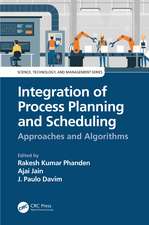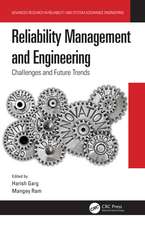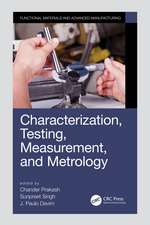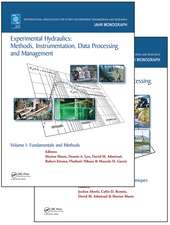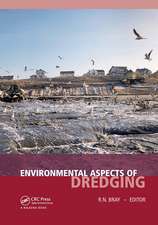Floods: Volume 2- Risk Management
Editat de Freddy Vineten Limba Engleză Hardback – 16 noi 2017
This second volume of the Floods series of books explores existing policies and tools which mitigate the impact of flooding: the construction of protective structures, the reduction of vulnerability, land use planning, the improvement of crisis management, etc. The closing chapters focus on the question of adaptation through post-flood reconstruction, integrating disaster risk reduction measures, e.g. through resilient urbanism.
- Presents the state-of-the-art surrounding flood issues, from the description of the phenomena, to the management of risk (dikes, dams, reducing vulnerability and management of crisis)
- Written by specialists, but accessible to mainstream scientists
- Exposes knowledge, methodologies, scientific locks and the prospects of each discipline on the theme of floods
| Toate formatele și edițiile | Preț | Express |
|---|---|---|
| Hardback (2) | 691.87 lei 5-7 săpt. | |
| ELSEVIER SCIENCE – 14 sep 2017 | 691.87 lei 5-7 săpt. | |
| ELSEVIER SCIENCE – 16 noi 2017 | 808.06 lei 5-7 săpt. |
Preț: 808.06 lei
Preț vechi: 1129.29 lei
-28% Nou
Puncte Express: 1212
Preț estimativ în valută:
154.64€ • 160.85$ • 127.67£
154.64€ • 160.85$ • 127.67£
Carte tipărită la comandă
Livrare economică 08-22 aprilie
Preluare comenzi: 021 569.72.76
Specificații
ISBN-13: 9781785482694
ISBN-10: 1785482696
Pagini: 424
Dimensiuni: 152 x 229 x 28 mm
Editura: ELSEVIER SCIENCE
ISBN-10: 1785482696
Pagini: 424
Dimensiuni: 152 x 229 x 28 mm
Editura: ELSEVIER SCIENCE
Public țintă
"scientists involved in flood risk assessment and managementStakeholders
First and upgrade students in environment, physical geography, hydrology"
Cuprins
Part 1. Strategic and Technical Aspects of Flood Prevention
1. Flood Management in France from 18th to 20th Centuries: A State Issue?
2. The French Flood Risk Management Model: Local Territories Facing State Omnipresency
3. Management and Safety of Flood Defense Systems
4. Coping Strategies in Dike Protected Areas
5. Floods and Land Rights: From Risk Prevention Plans to Administrative Accountability and Penal Liability
6. How Cost-Effective is Reducing the Vulnerability of Housing in Response to Flood Risk?
Part 2. Territories and Individuals at the Heart of Prevention
7. Does the Watershed Represent a Key Area within Flood Risk Knowledge and Management?
8. Sustainable Land Use Planning in Areas Exposed to Flooding: Some International Experiences
9. Societal Choices in Flood Risk Management, from Individual Responsibility to National Policy
10. Sustainable Flood Memories: Developing Concept, Process and Practice in Flood Risk Management
11. Integrating Anthropocentric Approaches into Flood Risk Management
Part 3. Anticipating and Managing Flood Events
12. Characteristics of Flood Events
13. Effectiveness of Institutional Alert Tools in Flood Forecasting in France
14. From Public Involvement to Citizen-based Initiatives: How Can Inhabitants Get Organized to Face Floods?
15. Crowdsourcing and Crisis-Mapping in the Event of Floods: Tools and Challenges
16. Flood Crisis Management: The Operational Perspective
17. Local Crisis Management – The Communal Safety Plan: Challenges and Obstacles to Operationality
18. Anticipating or Coping: Behaviors in the Face of Flash Floods
Part 4. Post-disaster Recovery and Adaptation
19. Disaster Memories and Population Resilience
20. Economic Resilience, Total Loss Control and Risk Transfer
21. Economic Assessment of Flood
22. Flood Debris Management
23. Post-Flood Recovery: An Opportunity for Disaster Risk Reduction?
24. Towards an Urban Design Adapted to Flood Risk?
1. Flood Management in France from 18th to 20th Centuries: A State Issue?
2. The French Flood Risk Management Model: Local Territories Facing State Omnipresency
3. Management and Safety of Flood Defense Systems
4. Coping Strategies in Dike Protected Areas
5. Floods and Land Rights: From Risk Prevention Plans to Administrative Accountability and Penal Liability
6. How Cost-Effective is Reducing the Vulnerability of Housing in Response to Flood Risk?
Part 2. Territories and Individuals at the Heart of Prevention
7. Does the Watershed Represent a Key Area within Flood Risk Knowledge and Management?
8. Sustainable Land Use Planning in Areas Exposed to Flooding: Some International Experiences
9. Societal Choices in Flood Risk Management, from Individual Responsibility to National Policy
10. Sustainable Flood Memories: Developing Concept, Process and Practice in Flood Risk Management
11. Integrating Anthropocentric Approaches into Flood Risk Management
Part 3. Anticipating and Managing Flood Events
12. Characteristics of Flood Events
13. Effectiveness of Institutional Alert Tools in Flood Forecasting in France
14. From Public Involvement to Citizen-based Initiatives: How Can Inhabitants Get Organized to Face Floods?
15. Crowdsourcing and Crisis-Mapping in the Event of Floods: Tools and Challenges
16. Flood Crisis Management: The Operational Perspective
17. Local Crisis Management – The Communal Safety Plan: Challenges and Obstacles to Operationality
18. Anticipating or Coping: Behaviors in the Face of Flash Floods
Part 4. Post-disaster Recovery and Adaptation
19. Disaster Memories and Population Resilience
20. Economic Resilience, Total Loss Control and Risk Transfer
21. Economic Assessment of Flood
22. Flood Debris Management
23. Post-Flood Recovery: An Opportunity for Disaster Risk Reduction?
24. Towards an Urban Design Adapted to Flood Risk?



